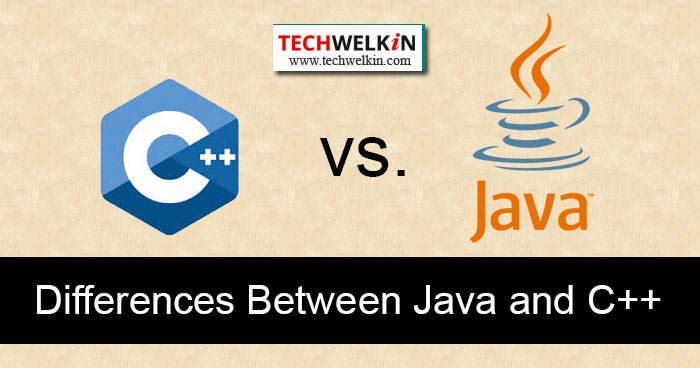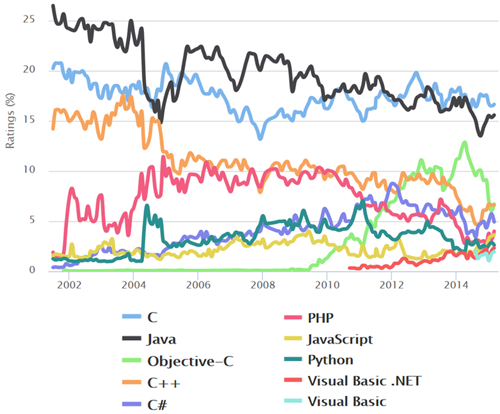C programming language makes the heart of modern complex computer systems. C++ came as a major boost to the capabilities of C language. Although the syntax and core was same, but there were considerable difference between C and C++. Later came Java programming language — which further enhanced the limits of what a programmer could easily do. Java has significant similarities and differences with C++. In this article we will discuss major differences between Java and C++ programming languages.
Differences Between Java and C++
Java language was developed by James Gosling to be a general-purpose, concurrent, class-based, object-oriented programming language. Java inherits its syntax from C language and structure from C++ language. The biggest difference between Java and C++ is how a program runs in these languages. While C++ program runs as executable native machine code; a Java program runs in a Java Virtual Machine (JVM). This clever idea of creating and using a virtual machine to run Java programs revolutionized the computer programing. This idea made Java programs machine independent while C++ programs could run only on machine they were designed for.

Memory management and exception handling are also very important aspects wherein Java and C++ differ. C++ programs were considered a bit unreliable because of the way C++ handled exceptions and memory. Java tried to solve these problems by better defining how exceptions should be dealt with and how the memory used by program is managed.

Comparison of usage of various programming languages during 2002 and 2015. Source: TIOBE index.
Table of Differences Between Java and C++
The following table lists the main differences between C++ and Java.
| C++ | Java | |
|---|---|---|
| 1. | C++ was developed by Bjarne Stroustrup. Development began in 1979. | Java was developed by James Gosling and his team. Development began in 1991. |
| 2. | C++ is a compiled language. | Java is both compiled and interpreted. |
| 3. | C++ supports conditional compilation and inclusion. | Java does not support conditional compilation. |
| 4. | C++ programs are platform dependent. They need to be compiled for a particular platform. | Java programs are platform independent. Java programs are written for Java Virtual Machine (JVM) and wherever a JVM is installed, Java program will run without needing recompilation. |
| 5. | C++ does support operator overloading. Function overloading is also available. | Java does not support operator overloading. However, function overloading is possible. |
| 6. | C++ fully support pointers. | Java has restricted support for pointers. Pointers are supported internally you can not writer pointer programs. |
| 7. | C++ supports structures. | Java does not support structures. |
| 8. | C++ supports unions. | Java does not support unions. |
| 9. | C++ does not have built-in support for threads. | Java fully supports threads. |
| 10. | C++ supports manual object management through new and delete keywords. | Java relies on automatic garbage collection. It does not support destructors the way C++ does. |
| 11. | C++ supports goto statement (however the use of goto is discouraged as not considered a good practice) | Java does not support goto statement (although goto is a reserved keyword in Java) |
| 12. | C++ supports multiple inheritance. | Java does not really support multiple inheritance. But similar results can be achieved through the use of interfaces. |
| 13. | C++ provides support both for call by value and call by reference. | Java supports only call by value. |
| 14. | C++ does not support comments within source code. | In Java programs, you can write comments using /** … */ |
| 15. | C++ has no support for the unsigned right shift operator ( >>> ). | Java supports the unsigned right shift >>> operator. |
| 16. | C++ provides virtual keyword to support function overriding. | Java does not support virtual keyword. All the non-static Java functions are by default virtual in nature, and therefore, can be overridden. |
Both Java and C++ programming languages have had a massive impact on the system and application development. Both languages are still among to most popular choices made the computer programmers around the world. It’s almost poetic how C evolved into C++ and then C++ evolved into Java.
We hope that this article on the differences between Java and C++ was useful for you. Please feel free to share your questions, comments and suggestions in the comments section below. Thank you for using TechWelkin!

Java is also object-oriented, whereas C is not. Java allows a user to create classes that contain data and methods. C is not capable of doing that.
C++ formed the base of making Java, they both portray many differences in working, performance, structure, design and execution. Many thanks for sharing this difference.
hey, Thanks for sharing this difference between cpp and java. All points are good and important to know when comparing these two.Thanks for sharing.